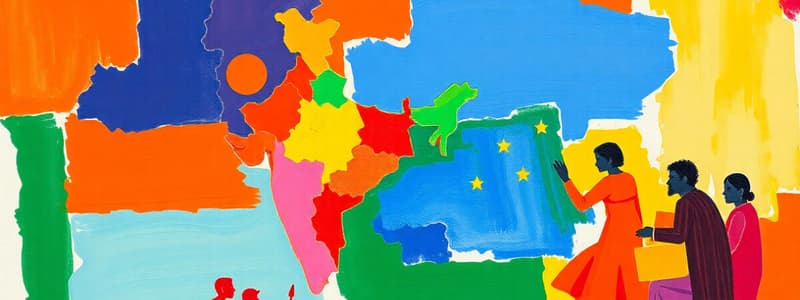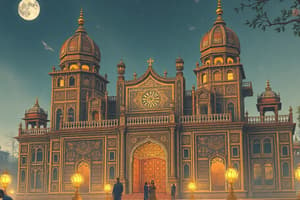Podcast
Questions and Answers
Which ancient civilization is known for its advanced urban planning?
Which ancient civilization is known for its advanced urban planning?
- Gupta Empire
- Mughal Empire
- Indus Valley Civilization (correct)
- Maurya Empire
Which of the following was a significant figure in the Indian freedom struggle?
Which of the following was a significant figure in the Indian freedom struggle?
- Jawaharlal Nehru (correct)
- Rani Lakshmibai
- Baba Ramdev
- Rajiv Gandhi
What is the primary purpose of a country's fiscal policy?
What is the primary purpose of a country's fiscal policy?
- Supervise stock market activities
- Promote international trade agreements
- Regulate inflation through interest rates
- Manage government spending and taxation (correct)
Which mountain range is considered the northern boundary of India?
Which mountain range is considered the northern boundary of India?
Which fundamental right provides for freedom of speech and expression?
Which fundamental right provides for freedom of speech and expression?
Which of the following correctly identifies a type of aquatic ecosystem?
Which of the following correctly identifies a type of aquatic ecosystem?
Which of the following is the primary sector of the economy?
Which of the following is the primary sector of the economy?
Which legislation aims to protect India's environment and promote sustainability?
Which legislation aims to protect India's environment and promote sustainability?
Flashcards
Ancient India: Key Periods and Civilizations
Ancient India: Key Periods and Civilizations
The Indus Valley Civilization, Vedic Age, and empires like Maurya and Gupta.
Medieval India: Key Empires and Movements
Medieval India: Key Empires and Movements
The Delhi Sultanate and Mughal Empire, along with Bhakti and Sufi movements.
Modern India: Key Events and Figures
Modern India: Key Events and Figures
British colonial rule, the freedom struggle, and leaders like Gandhi, Nehru, and Bose.
Physical Geography: Key Components
Physical Geography: Key Components
Signup and view all the flashcards
Human Geography: Key Focus Areas
Human Geography: Key Focus Areas
Signup and view all the flashcards
Indian Constitution: Key Features
Indian Constitution: Key Features
Signup and view all the flashcards
Indian Political Structure: Key Components
Indian Political Structure: Key Components
Signup and view all the flashcards
Indian Elections: Key Features
Indian Elections: Key Features
Signup and view all the flashcards
Study Notes
General Knowledge for BPSC Teaching Exam
Indian History
- Ancient Period: Indus Valley Civilization, Vedic Age, Maurya and Gupta Empires.
- Medieval Period: Delhi Sultanate, Mughal Empire, Bhakti and Sufi movements.
- Modern Period: British colonial rule, freedom struggle, key figures (Gandhi, Nehru, Bose).
Geography
- Physical Geography: Major landforms, rivers, mountain ranges, climate zones of India.
- Human Geography: Population distribution, urbanization, demographic trends.
- Indian States: Capitals, major geographical features, cultural significance.
Indian Polity
- Constitution: Fundamental Rights, Duties, and Directive Principles.
- Political Structure: Central and State Governments, three branches (Executive, Legislature, Judiciary).
- Elections: Election Commission, types of elections, voting process.
Economy
- Basic Concepts: GDP, inflation, fiscal policy, monetary policy.
- Sectors: Primary, secondary, and tertiary sectors; major industries in India.
- Current Affairs: Recent economic reforms and policies.
Environment
- Ecosystems: Types of ecosystems (terrestrial and aquatic), biodiversity.
- Environmental Issues: Pollution, climate change, deforestation, conservation efforts.
- Legislation: Key environmental laws and international agreements.
Science and Technology
- Basic Principles: Fundamental concepts in physics, chemistry, and biology.
- Recent Developments: Innovations in information technology, space research, biotechnology.
- Health and Medicine: Major health issues, healthcare system in India, recent advancements.
Current Affairs
- National Events: Recent policies, political changes, notable events in India.
- International Relations: India’s relations with neighboring countries, key international organizations.
- Sports and Culture: Significant achievements in sports, cultural milestones.
Important Personalities
- Historical Figures: Key leaders in Indian history.
- Contemporary Figures: Current leaders in politics, science, sports, and arts.
Miscellaneous
- Quiz and Trivia: Common questions asked in BPSC exams, important days and dates.
- General Awareness: Major news events, awards and recognitions, national symbols.
Indian History
- Ancient Period includes significant civilizations like Indus Valley, Vedic Age, and powerful empires such as Maurya and Gupta.
- Medieval Period marked by the establishment of the Delhi Sultanate and Mughal Empire; characterized by Bhakti and Sufi movements promoting spiritual unity.
- Modern Period encompasses British colonial dominance, the freedom struggle led by key figures like Gandhi, Nehru, and Bose advocating for independence and social reforms.
Geography
- Physical Geography details India's major landforms like plains, plateaus, and mountain ranges, alongside major rivers and climate zones.
- Human Geography focuses on population distribution patterns, urbanization phenomena, and demographic trends shaping societal structure.
- Indian States vary in capitals, geographical features, and cultural significance, impacting local governance and identity.
Indian Polity
- Constitution outlines the Fundamental Rights, Duties of citizens, and Directive Principles guiding governance and social justice.
- Political Structure divides power among Central and State Governments with three branches: Executive, Legislature, and Judiciary ensuring checks and balances.
- Elections are overseen by the Election Commission, featuring various types of elections and a systematic voting process for citizen participation.
Economy
- Basic Economic Concepts include GDP as a measure of national wealth, alongside inflation and fiscal and monetary policies influencing economic stability.
- Economic Sectors are categorized into primary (agriculture), secondary (manufacturing), and tertiary (services), with major industries driving growth.
- Current Affairs reflect recent economic reforms and policies, demonstrating shifts towards liberalization and technology-driven growth.
Environment
- Ecosystems are classified into terrestrial and aquatic types, highlighting the importance of biodiversity in sustaining ecological balance.
- Environmental Issues include critical concerns like pollution, climate change, and deforestation, alongside national and global conservation efforts.
- Legislation encompasses key environmental laws and international agreements aimed at protecting and preserving natural resources.
Science and Technology
- Basic Principles in science involve fundamental concepts from physics, chemistry, and biology foundational to advanced studies.
- Recent Developments cover innovations in information technology, space research advancements, and breakthroughs in biotechnology affecting various sectors.
- Health and Medicine address major health challenges in India, examine the healthcare system, and highlight recent medical advancements improving public health.
Current Affairs
- National Events involve significant policy changes, political developments, and notable incidents influencing domestic affairs in India.
- International Relations examine India's diplomatic ties with neighboring countries and participation in key international organizations like the UN and G20.
- Sports and Culture celebrate significant achievements in athletics and cultural milestones that enhance national pride and identity.
Important Personalities
- Historical Figures include influential leaders who shaped India’s past, contributing to its political, social, and cultural heritage.
- Contemporary Figures represent current leaders across various fields such as politics, science, sports, and arts, impacting modern India.
Miscellaneous
- Quiz and Trivia feature common queries encountered in BPSC exams, highlighting important events, days, and historical dates.
- General Awareness focuses on major news stories, national awards and recognitions, and symbols representing Indian identity and unity.
Studying That Suits You
Use AI to generate personalized quizzes and flashcards to suit your learning preferences.




